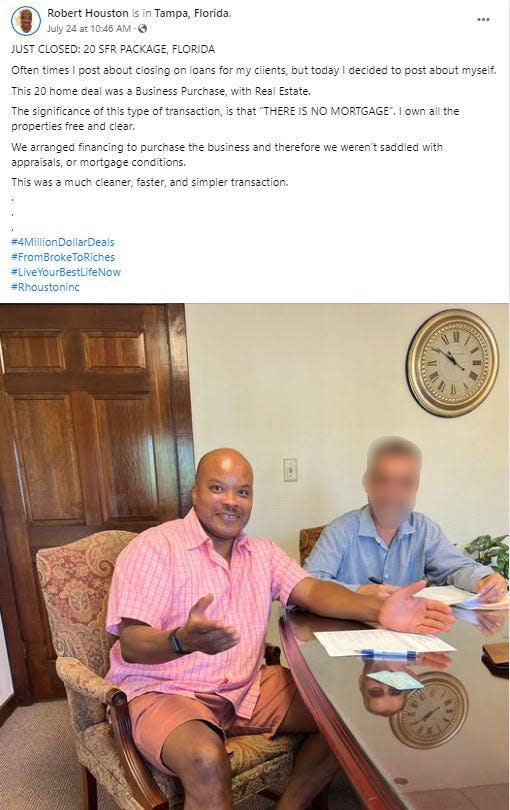Despite being victim of fraud, Sarasota company may still have to repay big loan

A Sarasota real estate business may still be liable for $1.3 million in loans even after police arrested a pair of Parrish residents in January on charges they improperly took control of the business and fraudulently mortgaged the company's properties.
Sarasota Police arrested Robert Houston, 49, and Linda Lukas, 72, on numerous fraud counts alleging they assumed leadership of Glenco Properties Group Corp. in 2022 using the state's online business directory before then mortgaging some of the 21 properties owned by an elderly Sarasota woman and her son, according to an arrest report. Both remain in jail awaiting trial.
Despite the fraud charges, a Florida law passed in 1971 aimed at "the worthwhile end of uncluttering the channels of commerce" could mean Glenco Properties' owners will have to pay back the $1.3 million, even though they had nothing to do with the financing deal and brought a civil suit as soon as they found out about the unauthorized borrowing.
Sarasota Circuit Judge Hunter W. Carroll broke that news to Glenco Properties Group last month while denying the corporation's motion for summary judgement in favor of the owners.
Property owners may be victimized twice
Glenco's attorneys argued common law put a duty on lenders to "make a reasonable inquiry" before loaning the money, citing a 1925 Florida court case. They argued the mortgages should not be valid, as the lenders should have investigated fraudulent leases allegedly submitted during the loan approvals by Lukas and Houston.
The lease documents, according to police, did not include any actual tenants and some of the leases used names of people Houston associated with on Facebook.
Carroll noted in the denial of summary judgement sought by Glenco that Florida law does leave open the opportunity that "a lender's failure to investigate might make it an accomplice to the fraud," before saying Glenco's attorneys had not yet proven that through evidence.
"Glenco Properties will have the burden at trial to demonstrate conduct by the lenders (or their agents) that was fraudulent or inaction resulting in the conclusion the lenders were accomplices in the fraud ...," Carroll wrote.
Brian Hoffman, a Pensacola attorney with the firm Carver Darden, wrote about a similar property fraud for a Florida Bar publication in 2018. He reviewed the judge's order and called it a balanced, well-reasoned application of statute.
“The downside on that is Glenco is going to have to spend more money going to a final hearing,” Hoffman said. “But I think the court got it right."
He said the statute Carroll cited is only one sentence long, which clearly states its intent to limit liability of lenders in Florida. He said that if more duties are placed on lenders, it could cause some to decide not to do business in Florida, while raising costs on consumers.
No push to change old law, despite fraud
“You can’t expect the courts to come in on unique cases that are the outliers and not the norm and expect the courts to maneuver and shift public policy to get the right outcome,” he said. “With two innocent victims, you’re never going to find it anyways."
Hoffman also pointed to some quit claim deeds mentioned in the judge's order that appeared to leave the door open for Glenco to prevail at trial. After Houston allegedly took control of the company, he deeded the properties to a company he owned, according to court records.
Those quit claim deeds could have triggered a duty to investigate, Carroll noted in his order, but the Glenco attorneys had not provided enough evidence for Carroll to make that conclusion.
Hoffman said similar types of fraud are on the rise in Florida, particularly on vacant property where an owner does not regularly check on it. He said that some county clerks offices offer property notification services, which can be helpful in identifying fraud early.
“The title industry is getting hit with a lot of different fraud schemes on a lot of different fronts,” Hoffman said. “It’s not a one-front war. It’s a multifront war.”
However, few in the title or banking industry appear to want more requirements or regulations aimed at preventing fraud as it would mean increased liability, work loads and likely increased costs to customers.
“As much as everyone wants to stop the fraud, no one wants more added to their job description that they are not going to be paid for,” he said. "And no one's gung-ho to add all these additional expenses to consumers, many of which will never suffer this type of fraud loss.”
The Herald-Tribune spotlighted the use of the state's business directory at Sunbiz.org in the alleged fraud. Houston is accused of filing fraudulent information with Sunbiz that named him the company's chief executive officer that he then used to take out mortgages on Glenco's properties.
Sarasota State Rep. Fiona McFarland succeeded in passing a bill to allow the state's Division of Corporations — the state agency that oversees Sunbiz.org — to implement a password system to prevent similar unauthorized takeovers of businesses.
But that state-maintained website continues to have the glaring vulnerability that allows anyone to change or update Florida companies officers, registered agents and mailing addresses by updating an annual report online.
Previous reporting Stranger accused of using website flaw to hijack Sarasota man's real estate business
More: State Rep. Fiona McFarland's Sunbiz bill signed by Gov. DeSantis
This article originally appeared on Sarasota Herald-Tribune: Company victimized by alleged fraud, but may owe lenders $1.3 million
